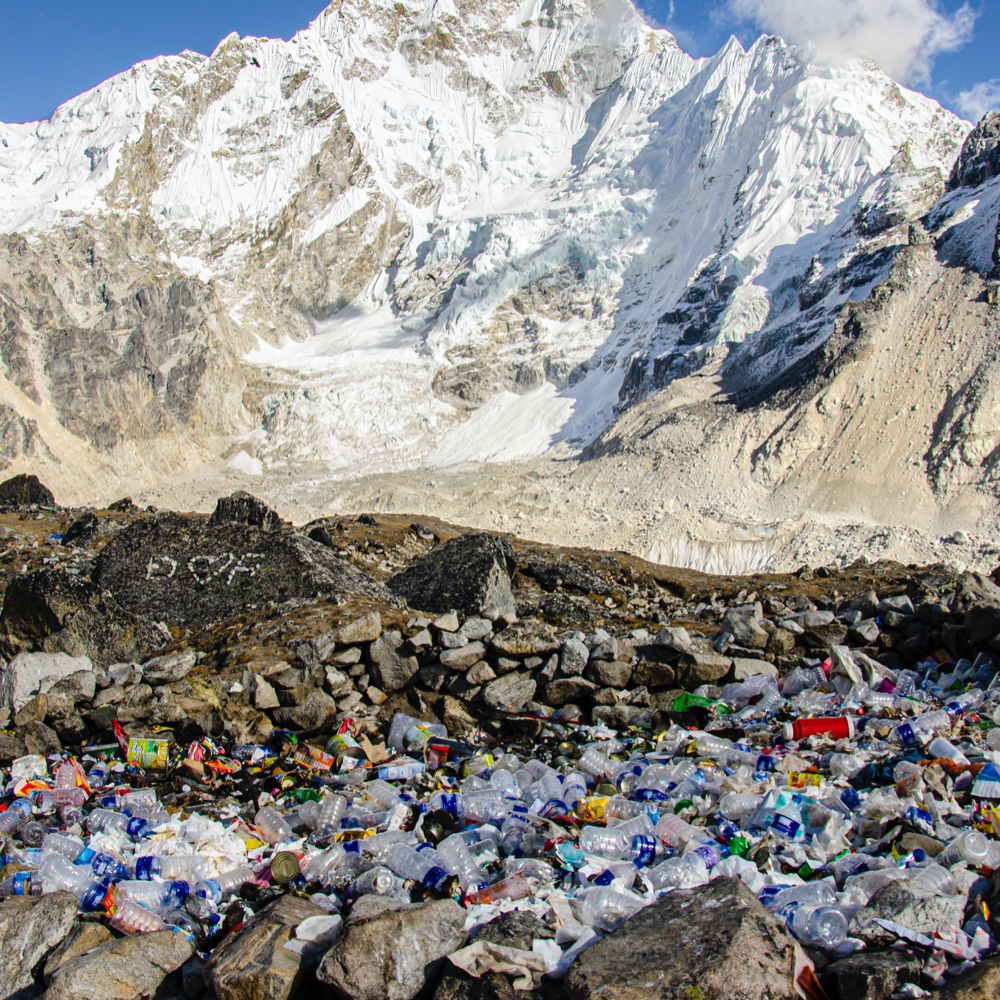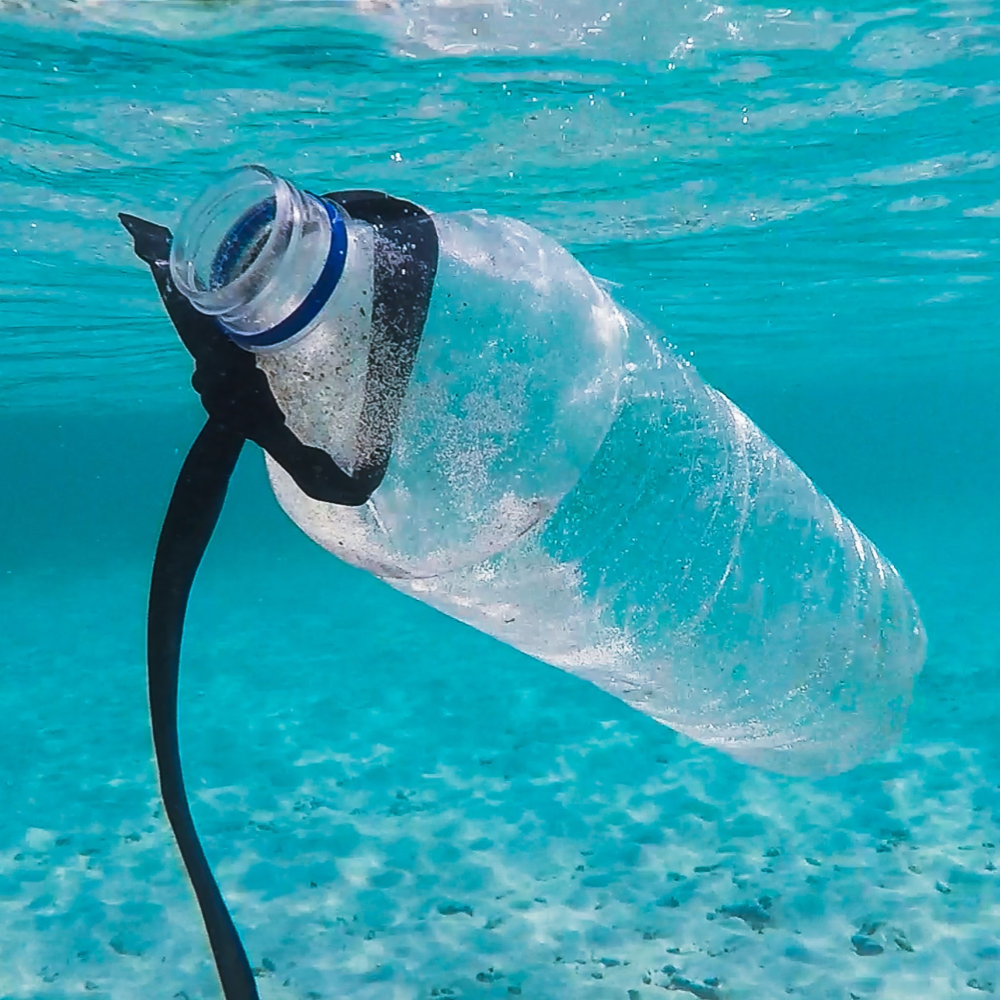Latest update: April 2025
Sustainable hydration basically means meeting our water needs in an environmentally friendly, socially responsible, and economically viable way. This includes reducing our use of single-use plastic water bottles, protecting and preserving water sources, and practicing water conservation measures.
As the world's population continues to grow, and climate change causes droughts and water shortage to become more common, sustainable hydration is becoming an increasingly important topic. With fresh water being one of our most valuable resources, it's important that we find ways to ensure that it is managed and used in a sustainable way.
By adopting sustainable hydration practices, we can not only protect this vital resource but also help to build a more sustainable future for all.
The environmental impact of plastic water bottles
Plastic water bottles are common in our daily lives, whether it's at work, school, or on the go. However, the convenience of these bottles comes at a significant cost to the environment. The production, transportation, and disposal of plastic water bottles have a big impact on the planet and its ecosystems. One of the biggest issues with plastic water bottles is their production process.
Plastic bottles are made from petroleum, a non-renewable resource, and the production process requires a significant amount of energy. This results in the emission of greenhouse gases, which contribute to global warming. Furthermore, the transportation of these bottles from the factory to the consumer also requires energy, adding to the environmental footprint of each bottle.
Another significant environmental impact of plastic water bottles is their disposal. Plastic bottles are not biodegradable, meaning they do not break down naturally in the environment. Instead, they break down into tiny pieces called micro-plastics that last for hundreds of years and can cause harm to wildlife and marine life. Plastic bottles can also end up in landfills, where they take up valuable space and release harmful chemicals into the soil and water.
Additionally, plastic water bottles are often used only once before being thrown away, creating a huge amount of waste. According to some estimates, over 50 billion plastic water bottles are thrown away each year in the United States alone. This waste not only clogs landfills, but it also harms wildlife, such as sea turtles and whales, who often mistake plastic for food, which leads to malnutrition or starvation.
The environmental impact of plastic water bottles is far and wide. By reducing our use on single-use plastic bottles, we can help cut down the amount of plastic waste in the environment and protect the planet for future generations.
What is the Ocean Plastic Problem?
The ocean plastic problem is the accumulation of plastic waste in the world's oceans. Plastic waste comes from various sources, including landfills, industrial waste, and litter.
When plastic waste is not disposed of properly, it ends up in waterways, rivers, and eventually, the ocean. According to research, around eight million metric tons of plastic waste enters the ocean annually, and this number is expected to double by 2030.
The impact of Ocean Plastic Problem
The impact of ocean plastic pollution on marine life is alarming. Plastic waste harms sea turtles, whales, dolphins, and other marine animals that mistake it for food. These animals suffer from entanglement, ingestion, and suffocation caused by plastic debris.
Examples
One example of plastic pollution is the Great Pacific Garbage Patch, located between Hawaii and California. It is estimated to be twice the size of Texas and comprises plastic debris, fishing nets, and other garbage. This garbage patch has a devastating impact on marine life and the environment.
Another example of plastic pollution is the Klang River in Malaysia, which has been described as one of the most polluted rivers in the world. The river is heavily contaminated with plastic waste, and the situation is so severe that it affects the livelihoods of local fishermen and the health of the people who live near it.
The Citarum River in Indonesia is also heavily polluted with plastic waste and has been dubbed the world's most polluted river. The river is so contaminated with plastic waste that it is almost impossible to see the water, and it is a health hazard for the people who live near it.
These are just a few examples of the devastating impact of plastic pollution. Plastic waste is not only an environmental and climate laws issue but also a social and economic issue that affects people's health and livelihoods. It is a problem that affects us all and requires urgent action.
The ocean plastic problem also has economic consequences. Coastal communities rely on fishing and tourism, both of which are negatively impacted by plastic pollution. According to a report by the World Wildlife Fund (WWF), the cost of ocean plastic pollution to the global economy is around $13 billion per year.
How do plastic bottles end up in the ocean?
When you see pictures of plastic bottles in the ocean you might think that someone has just thrown it straight in, but usually this isn't the case.
Plastic bottles can also reach the ocean indirectly, even if binned in areas far away from the ocean. Due to their lightweight nature, they are easily carried by wind and rain, often ending up scattered in surrounding environments away from landfill. Consequently, these bottles may blow onto roadsides, where they can be swept into storm drains during heavy rainfall.
From there, they enter the river systems connected to these drains and are eventually carried out to sea. This route shows us how connected we are from the land to the ocean ecosystems, highlighting the need for good waste management programs to stop plastic pollution from reaching the ocean.


The impact of plastic waste on marine life
Once the plastic waste makes it's way into the ocean, sea turtles and other marine animals can mistake plastic debris for food, which can lead to starvation, suffocation, or entanglement. Additionally, the production of plastic water bottles requires fossil fuels, which contributes to climate change.
For example, it takes about three litres of water to produce one litre of bottled water, and the energy required to transport bottled water to consumers can also be significant.
What about plastic bottles and human health?
Plastic water bottles can also be harmful to human health, as they can leach chemicals into the water they contain, especially when exposed to heat.
For example, when plastic bottles are exposed to high temperatures such as in a car or sat outside in the sun, chemicals such as Bisphenol A (BPA) can leach into the water, which can be harmful when consumed.
What is BPA?
Bisphenol A (BPA) is a chemical compound commonly found in many plastics and epoxy resins used in food and beverage containers, dental sealants, medical devices, and thermal paper receipts. While initially considered safe, extensive research has raised concerns about the potential health effects of BPA exposure, particularly its endocrine-disrupting properties.
One significant concern regarding BPA is its ability to mimic the hormone estrogen in the body, leading to hormonal imbalances and interference with the endocrine (a network of glands and organs in the body that produce and release hormones) system's normal functioning.
This interference can have wide-ranging effects on human health, including reproductive disorders, such as infertility, reduced sperm quality, and menstrual abnormalities. Additionally, prenatal exposure to BPA has been linked to developmental issues in children, such as impaired neurobehavioral development and increased risk of obesity and metabolic disorders later in life.
Research suggests that BPA exposure may contribute to an increased risk of certain chronic conditions, including cardiovascular disease, diabetes, and cancer. Studies have shown associations between elevated BPA levels in the body and an elevated risk of these diseases, although the exact mechanisms underlying these associations are still being investigated.
Why stainless steel water bottles are the future
Stainless steel is a popular choice for reusable bottles and coffee cups due to its durability and resistance to corrosion. This versatile material is made up of a combination of iron, chromium, nickel, and other metals that give it its unique properties.
One of the main benefits of stainless steel is its ability to resist rust and corrosion and it does not leach chemicals into the beverage like plastic or aluminum. This makes it an ideal choice for high quality drinkware that will be used in outdoor or high moisture environments, such as water bottles, travel mugs, and cups.

The chromium in the alloy forms a protective layer on the surface of the steel, which prevents oxidation and rusting. This means that your drinkware will last longer and maintain its appearance without rust or discolouration. Stainless steel is also very durable, making it perfect for use in high-traffic areas, such as in restaurants or at events.
It can withstand frequent cleaning, heavy usage, and accidental drops, which makes it a great choice for those looking for long-lasting and reliable drinkware.
Another great benefit of stainless steel is that it is a very hygienic material. It does not absorb any odors or flavours, and it is easy to clean, which makes it a great choice for drinkware that will be used for different types of beverages.
In addition, stainless steel is also a great choice for those looking for an eco-friendly option. It is a sustainable material that is 100% recyclable and can be repurposed multiple times. This makes it a great choice for those looking to reduce their environmental impact. In conclusion, stainless steel is a great option for drinkware due to its durability, resistance to corrosion, and hygienic properties. It is a sustainable choice that can withstand heavy usage and maintain its appearance over time

Are metal water bottles good for the environment?
Stainless steel water bottles are a highly sustainable alternative to single-use plastic water bottles. There are a number of reasons why stainless steel water bottles are a better choice for the environment:
Durability: Stainless steel water bottles are extremely durable and can last for years. This means that they can be used over and over again, reducing the need for constantly purchasing new plastic water bottles.
Recyclability: Stainless steel is a highly recyclable material. When a stainless steel water bottle reaches the end of its useful life, it can be melted down and made into a new product, such as a new water bottle or a car part.
Non-toxic: Stainless steel is a non-toxic material, meaning that it does not release any harmful chemicals into the water it holds or the environment. In contrast, plastic water bottles can contain a variety of harmful chemicals, such as Bisphenol-A (BPA), which can leach into the water over time.
Cost-effective: While stainless steel water bottles may cost more initially than plastic water bottles, they are a much more cost-effective choice in the long run. Because they can last for years and be recycled at the end of their life, they do not need to be continually replaced like plastic water bottles.
Stylish and versatile: Stainless steel water bottles come in variety of styles and sizes which allow you to carry them on any activities, sports, trips, outdoor activities etc.
Stainless steel water bottles are a highly sustainable alternative to single-use plastic water bottles. They are durable, recyclable, non-toxic, cost-effective and stylish. By switching to a stainless steel water bottle, you can help reduce your environmental impact and make a positive difference in the world.

The practical benefits of stainless steel water bottles to plastic
One of the biggest practical benefits of stainless steel water bottles is their durability. Stainless steel is known for its strength and resistance to wear and tear, making it a great option for individuals who are looking for a water bottle that will last for a long time. Unlike plastic water bottles, which can crack or become discolored over time, stainless steel water bottles can withstand the test of time and will remain looking as good as new for many years to come.
Another benefit of stainless steel water bottles is that they are safe for both hot and cold liquids. Unlike plastic water bottles, which can break down or release harmful chemicals when exposed to hot liquids, stainless steel water bottles are completely safe for use with hot and cold beverages. This makes them a great option for individuals who like to drink coffee or tea on the go, as well as those who like to bring ice water with them to stay hydrated during the day.
In terms of environmental impact, stainless steel water bottles are also a more sustainable option. Plastic water bottles are a major contributor to plastic pollution, with millions ending up in landfills or the ocean each year. Stainless steel water bottles, on the other hand, can be reused for years, reducing the amount of waste that ends up in the environment. Additionally, stainless steel water bottles are typically more easily recyclable than plastic water bottles, making them a more eco-friendly choice.
Lastly, stainless steel water bottles have a sleek and modern appearance. They are available in many different sizes and shapes and can be branded water bottles with different designs and decals. In contrast, plastic water bottles tend to be less visually appealing and lack the modern look and feel of a stainless steel water bottle.
Stainless steel water bottles offer many practical benefits that make them a great choice for individuals who are looking for a durable, safe, and eco-friendly water bottle option. While plastic water bottles may be cheaper and more widely available, the long-term benefits of a stainless steel water bottle make it well worth the investment.
Stainless steel water bottles are a smart and eco-friendly choice for staying hydrated on the go. Not only do they keep your drinks cold or hot for hours, but they also eliminate the need for disposable plastic bottles that contribute to pollution and waste.
By investing in a high-quality stainless steel water bottle, you can not only improve your own health and well-being, but also make a positive impact on the environment. So, the next time you're heading out the door, reach for a stainless steel water bottle and enjoy doing your part in protecting our planet in a small way.
Bonus: Earth Day 2025
What is Earth Day?
Whilst we're on the the topic of sustainable hydration - Earth Day is an annual event celebrated on April 22nd to raise awareness about environmental issues and inspire people to take action to protect the planet.
The first Earth Day was held in 1970, and since then, it has grown into a global movement with millions of people participating in activities and events to show their support for the environment.
History of Earth Day:
Earth Day was founded by Senator Gaylord Nelson, a US senator from Wisconsin, who was deeply concerned about the environmental degradation caused by human activities. In 1969, he proposed a national "teach-in" on human beings on the environment, which he called "Earth Day."
On April 22nd, 1970, the first Earth Day was celebrated, and it was a huge success. Approximately 20 million people across the United States participated in rallies, demonstrations, and other events to support environmental protection and other living species.
In the years following the first Earth Day, the environmental movement gained momentum, and the US government passed several laws to protect the environment, and climate laws including the Clean Air Act, the Clean Water Act, and the Endangered Species Act.
Today, Earth Day is celebrated in more than 190 countries worldwide, and it continues to be a powerful force for environmental action and awareness.
Join the Movement for a Sustainable Future
Let's take action to protect our planet and its natural resources. By supporting sustainable companies like Just Bottle, customers can make a positive impact on the environment and contribute to a more sustainable present and future generations.
Join us in the movement for a better tomorrow. Thank you for choosing Just Bottle as your eco-friendly and sustainable water bottle provider.
Written by the Just Bottle team
With years of experience in sustainable product design, the Just Bottle team specializes in creating high-quality, reusable drinkware that helps reduce waste and remove plastic from our oceans. Our insights are grounded in real-world use, product development expertise, and a deep commitment to environmental impact












